- Home
- Alex Archer
The Golden Elephant Page 3
The Golden Elephant Read online
Page 3
Annja pursed her lips. She had some experience with what could be seen from satellites—and also of things that could not. She chose her words carefully.
“It’s a matter of who pays attention to what image,” she said. She told herself she didn’t need any extra complications. “Not everyone who runs across overhead imaging of, say, a lost temple has the knowledge to recognize what they’re looking at. And many of the most skilled image analysts don’t care. They’re looking for military information, or maybe stray nuclear materials. Not ancient ruins. Although some pretty astonishing ruins have been discovered by overhead photography, just in the last couple of decades.”
“So I gather,” Sir Sidney said. “Well, I must say it does a body good to believe there’s still some mystery left in this old world of ours. Quite bracing, actually.”
She raised a brow. “Aren’t you the expert in lost treasures and fabled ruins?”
He smiled. “My dear, the operative word there is fabled. I am, as you know, a cultural anthropologist. Specifically I am a mythologist. I study the phenomena of myths. Particularly pertaining to myths about lost treasures.”
He grinned. “But there’s very little more exciting than the possibility a myth turns out to be true.”
She had to laugh, both at what he said and his very infectious enthusiasm. “That’s how I feel about it.” Usually, she thought. “And there’s a very definite possibility the trail I’m on might lead to a myth being confirmed.”
He waved grandly. “If I can be of any assistance to a lovely young woman such as yourself—”
He paused to pour more tea and stir in plenty of milk.
“I’ve got to thank you again for sharing your time with me,” Annja said.
“Nonsense, nonsense. The pleasure is mine. I am retired, after all. It’s not as if there are abundant claims upon my time these days. My partner of many years died last year. It was quite sudden.”
“I’m sorry,” Annja said.
“Don’t be,” her host replied. “I’m sure you had nothing to do with it, my dear. I can’t say I’ve grown comfortable with it, or ever shall, I fancy. Doubtless I’ve not that long left in which to do so. On the whole I must say I’m rather glad it happened the way it did. So suddenly and all. It saved him the suffering of a long and possibly agonizing decline—saved us both, really. And at our age it’s not as if our own mortality was a tremendous surprise to us. We’ve seen enough old chums put into the ground to have few illusions on that score.”
Annja smiled.
Sir Sidney leaned forward. “Now,” he said, “suppose you tell me this myth you’re trying to pin like a butterfly to reality’s board.”
After a moment’s pause—she didn’t really like thinking of it that way—Annja did. She shared such scanty information as Roux had provided, plus a few not very helpful details from a file he had subsequently e-mailed her.
Sir Sidney sat listening and nodding. Then he smiled and sat back. “The Golden Elephant,” he said ruminatively. “So you’ve reason to believe it’s real?”
Her heart jumped. “You’ve heard of it?”
“Yes,” he said. “Please don’t get your hopes up quite yet. Just let me think a moment, see what I can recall which might prove of use. Do you mind if I smoke my pipe?”
“No,” Annja said. He produced a pipe from an inner pocket, took up tobacco and various arcane tools from a silver tray on the table next to him.
“I’m a little bit puzzled by one aspect of this,” Annja admitted as he lit up. His pipe smoke had a sweet but not cloying smell. Annja had never particularly disliked pipe smoke, unlike cigarette smoke. She hoped the interview wasn’t going to go on too long, though. The parlor was stuffy, with windows closed and heat turned up against the damp autumn London chill. In this closeness even the most agreeable smoke could quickly overwhelm her. “I thought Southeast Asia was mostly Buddhist.”
“Quite,” Sir Sidney said, puffing and nodding.
“Not that I know much about Asian mythology. But I’d associate elephants with the Hindu god Ganesha, rather than anything Buddhist.”
He smiled. Blue-white smoke wreathed his big benign pink features. “Ah, but elephants are most significant beasts in all of Asia,” he said, clearly warming to the role. “Not just big and imposing creatures, but economically important.”
“Really?”
“Just so. It needn’t surprise us too much that the elephant occupies a role in Buddhist symbolism. It symbolizes strength of mind. Buddhists envision what they call the Seven Jewels of Royal Power. These basically constitute the attributes of earthly kingship.
“One of these jewels is the Precious Elephant. It represents a calm, majestic mind. Useful trait in a king, although one honored more in the breach than the observance, as it were.”
“If Asian history is anything like that of Renaissance Europe,” Annja said, “that’s probably an understatement.”
He chortled around the stem of his pipe.
They spoke a while longer. Annja enjoyed the old man’s conversation. But she increasingly felt restless. “Are you remembering any more about the myths regarding our fabulous Golden Elephant?” she asked.
He puffed. “It’s said to have emeralds for eyes.” His own pale blue eyes twinkled. His manner suggested a child telling secrets.
She leaned forward, pulse quickening. “That sounds like my elephant.”
“Don’t put it in your vest pocket yet, my dear,” he said. “I’m not yet dredging up much from the murky depths of my poor old brain. But I recall hints of travelers’ tales. Even reports from a certain scientific expedition from early this—in the twentieth century.”
He shook his head. “I find it most disconcerting to refer to the twentieth century as the last century. It may not strike you so, of course.”
She shrugged. “I don’t think about it too much. It does strike me a little odd sometimes that there are people capable of holding intelligible conversations who were born in the twenty-first century.” She laughed. “I guess that means I’m getting old.”
He guffawed. “Not at all, my dear!” he said. “Not by a long shot. I dare say, I don’t think you’ll ever grow old.”
She looked sharply at him.
“I’m sorry,” he said quickly. “I suppose that could be misconstrued, couldn’t it? I didn’t mean you won’t enjoy a long and happy life. What I meant to convey was that however deeply your years accumulate, I anticipate that your outlook will remain youthful. For that matter, I don’t doubt the years will lie less heavily on you than me in any event. By all appearances you keep yourself far better than ever I did.” He patted himself on the paunch.
Annja looked studiously down into her tea and tried hard not to read her future there.
“Ah, but I see I’ve gone and spoiled your mood. Forgive a clumsy old man’s musings. Profuse apologies, dear child.”
“Not needed,” she said. She smiled. It wasn’t forced. She was a thoughtful person, but had no patience for brooding. “Do you have any suggestions how I can track down this expedition you mentioned?”
His big pink face creased thoughtfully. At last he made a fretful noise and shook his head.
“It eludes me for the moment,” he said. “I’ll see what I can dig up. In the meantime I do have a next step to suggest to you.”
“What’s that?”
“Why, visit that great repository of arcane archaeological knowledge, the British Museum, and see what you can turn up.”
She smiled. “I’ll do that. Thank you so much.”
“It’s nothing. Indeed, almost literally—doubtless you’ve thought of the museum already. It’s right down the lane and across the Tottenham Court Road, you know.”
“Yes. Thank you, Sir Sidney. You’ve encouraged me. Really. If nothing else, I know I’m not the only one with fantasies about an emerald-eyed gold elephant.”
She stood. “Don’t get up, please,” she said. “I can let myself out. You’ve got my
card—please call me if you think of anything. With your permission I’ll check back with you in a day or so.”
He beamed. “It would be my pleasure.”
On impulse, she went and kissed him on the forehead. Then, collecting her umbrella from the stand by the door—an antique elephant’s foot, she noted with amusement—she walked out of his flat into the rainy street.
4
About midafternoon Annja pushed herself back from the flat-screen monitor. She stretched, trying to do so as unobtrusively as possible. Her upper back felt as if it had big rocks in it.
She had spent a frustrating afternoon in the Paul Hamlyn Library, flipping through catalogs and skimming through semirandom volumes. She caught a whiff from the digitized pages of British Archaeology for fall 1921, which mentioned the Colquhoun Expedition of 1899 to what was then Siam. But when she tracked down the details, including Colquhoun’s journals and his report to the Explorers’ Club, he made nary a mention of gold elephants. With or without emerald eyes.
She shook her head. Certain needs were asserting themselves. Not least among them the need to be up and moving.
Checking her watch, Annja reckoned she had plenty of time for a turn through the Joseph E. Hotung Gallery, which held the Asian collections, before returning to her labors. She’d try the reading room next, and see if her luck improved.
The library jutted out to flank the main museum entrance from Great Russell Street. She emerged into the great court. It was like a time shift and somewhat jarring. The ceiling was high, translucent white, crisscrossed by what she took for a geodesic pattern of brace work, springing from a stout white cylindrical structure that dominated the center of the space. The cylinder housed the new reading room. The sterile style, which put her in mind of a seventies science-fiction movie, contrasted jarringly with the pseudo-Greek porticoed walls and their Dorian-capitaled pilasters.
The court wasn’t crowded. A few sullen gaggles of schoolchildren in drab uniforms; some tourists snapping enthusiastically with digital cameras were watched by security guards more sullen than the children. She was vaguely surprised photography was allowed.
She concentrated on movement, striding purposefully through milky light filtered from the cloudy sky above. She focused on the sensations of her body in motion, on being in the moment.
A sudden flurry of movement tugged at her peripheral vision. A female figure was walking, strutting more, through the room. Annja got the impression of a rounded, muscle-taut form in a dark blue jacket and knee-length skirt. Black hair jutted out in a kinky cloud behind the woman’s head, bound by an amber band.
Annja had never seen the woman in the flesh. But she had seen plenty of pictures on the Internet. Especially in the wake of her recent China adventure.
“Easy Ngwenya,” she said under her breath. She felt anger start to seethe. She turned to follow.
Without looking back, the young African woman continued through the hall, into the next room, which housed Indian artifacts. She moved purposefully. More, Annja thought, she moved almost with challenge. Her head was up, her broad shoulders back. She was shorter by a head than Annja, who nonetheless found herself pressed to keep pace.
Annja felt uncharacteristically unsure how to proceed. Her rival—she tried to think of her as quarry—could not have gotten her famous twin Sphinx autopistols through the Museum metal detectors, if she had even dared bring them into Britain. Although Annja suspected Easy would have smuggled the guns in. Great respect for the law didn’t seem to be one of her major traits.
So that was advantage Annja. No means known to modern science would detect her sword otherwise. Actually using it, with numerous witnesses and scarcely fewer security cameras everywhere, might prove a bit more problematic.
Easy Ngwenya made up Annja’s mind for her by stopping to peer into an exhibit case a few yards ahead of her. I’m practically committed now, anyway, Annja told herself.
The younger woman studied an exquisite jade carving of an elephant in an elaborate headdress, standing with trunk raised to bedangled forehead. Annja felt a jolt. Could she be here for the same reason I am? she thought with something akin to panic.
She dismissed the idea. A collector who came to Annja, even anonymously, would know of her reputation for honesty and integrity, even if she was willing to operate under the radar. Somebody so discerning would hardly recruit a tomb robber as notorious as Ngwenya. Would they? Anyway, elephants weren’t exactly an uncommon motif in Asian art, and Ngwenya might be forgiven a special interest in them, given she was named for one. Also it wasn’t gold.
Annja came up on Easy’s left.
“Annja Creed,” the younger woman said without looking around. Annja realized Easy must have seen her approach in the glass. “What a delightful surprise to encounter you here.”
“A surprise, anyway,” Annja said through gritted teeth, “after the way you marooned me on that tomb mound in the middle of a rising lake.”
“Did the boat I sent back for you not reach you?” Ngwenya asked. “You must have had an unpleasant swim. Not my intention, I assure you.”
“The boat came,” Annja admitted grudgingly. “That’s not the point. I’m…placing you under citizen’s arrest.”
Ngwenya’s laugh was musical and entirely unconcerned. “Why, whatever for?”
She turned to look up at Annja. Annja was struck by just how young the international adventuress looked. She was in her twenties, having gotten an early start at a life of adventure. Or crime. She looked fifteen.
Annja was also struck by just how pretty Easy was. She had a big rounded forehead, a broad snubbed nose, full lips, a small round chin. That should have been less of a surprise—despite the currently unfashionable fullness of her figure, Ngwenya occasionally did modeling, not always fully dressed. The curves, Annja knew from the pictures she’d seen online, did not come from excess body fat.
“You have committed countless violations of international law regarding traffic in antiquities. As you well know,” Annja said.
The girl batted her eyes at her. Annja wished she wouldn’t. They were huge eyes, the color of dark chocolate, with long lashes. Annja suddenly suspected why she was named “elephant calf.” She had eyes like one.
“You’d already looted the seal from the feet of Mad Emperor Lu,” Ngwenya pointed out. “Congratulations on getting past the booby traps, by the way.”
“I had official permission, if you must know,” Annja said. Whether it was the Museum’s cathedral atmosphere or her own desire to remain as unobtrusive as possible, she kept her voice low. She only hoped she wasn’t hissing like a king snake having a hissy fit. “I had all the proper paperwork.”
Ngwenya laughed loudly. “And so did I! Remarkable how easy such things are to come by for those willing to be generous to underappreciated civil servants. One is tempted to ascribe that to the customary blind Communist lust for money, but honestly, I wonder if it was any different back in dear old mad Lu’s day.”
“It’s not like it was an isolated incident. So come with me,” Annja said.
“You can’t be serious. There are people here. Behave yourself, Ms. Creed.”
“I told you—you’re under citizen’s arrest.”
The young woman laughed again. “Do you think such a legal archaism still has force? This is a country where someone who successfully resists a violent assault is likely to face brisker prosecution and longer jail terms than their attacker. Do you really think they’ll give weight to a citizen’s arrest? Especially by someone who isn’t a citizen? Or were you forgetting that little dust-up of a couple of centuries past? So many of your countrymen seem to have done.”
“When Scotland Yard gets your Interpol file,” Annja said, “they probably won’t be too concerned with the niceties of how you wound up in their custody, then, will they?”
“Oh, this is entirely absurd.” To Annja’s astonishment the young woman turned and walked away. Before Annja could respond, Easy had pushed through in
to a stairway to the upper level.
Frowning, Annja followed. She expected to find the stairwell empty. But instead of sprinting to the second level and through the door into the Korean exhibit Easy trotted upstairs. Her pace was brisk. But it definitely wasn’t flight.
You cocky little thing, Annja thought.
She caught her up just shy of the upper-floor landing. She grabbed Easy’s right arm from behind. It felt impressively solid. “Not so fast, there.”
Using hips and legs, Easy turned counterclockwise. She effortlessly torqued her arm out of Annja’s grasp. Her left elbow came around to knock Annja’s right arm away as if inadvertently. She thrust a short right spear hand straight for Annja’s solar plexus.
Annja anticipated the attack. Just. She couldn’t do anything about Easy fouling her right hand. But she bent forward slightly, functionally blocking the sensitive nerve junction with the notch of her rib cage while turning slightly to her right. Instead of blasting all the air from her lungs in one involuntary whoosh, the shorter woman’s stiffened fingers jabbed ribs on Annja’s left side.
Annja had no doubts about why they called that strike a spear hand. She felt as if she’d been stabbed for a fact. But that was just pain: she wasn’t incapacitated.
Knowing the omnipresent eyes of the surveillance cameras constrained her Annja straightened, trying at the same time to deliver a short shovel hook upward with her right fist into Ngwenya’s ribs. The woman’s short stature defeated her. The blow bounced off the pot hunter’s left elbow and sent another white spike of pain up Annja’s arm.
Ngwenya frowned at her. “Really, Ms. Creed,” she said primly, “this is most unseemly.”
There was a short flurry of discreet short-range strikes.
After a brief, grunting exchange, barely visible to the high-mounted camera, Easy Ngwenya sidestepped a short punch, reached with her right hand and caught Annja behind the left elbow. She squeezed.

 Rogue Angel: Forbidden City
Rogue Angel: Forbidden City The Spider Stone
The Spider Stone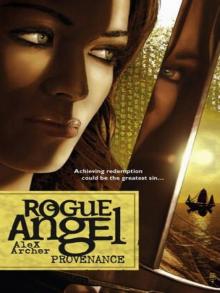 Provenance
Provenance Blood Cursed
Blood Cursed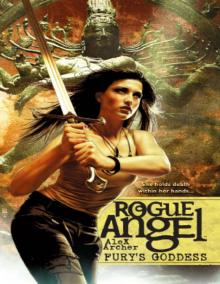 Fury's Goddess
Fury's Goddess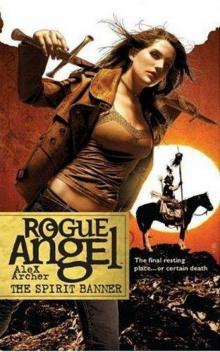 The Spirit Banner
The Spirit Banner Footprints
Footprints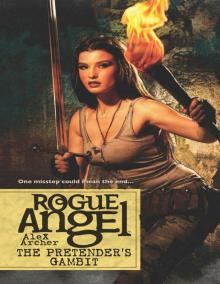 The Pretender's Gambit
The Pretender's Gambit Rogue Angel: The Lost Scrolls
Rogue Angel: The Lost Scrolls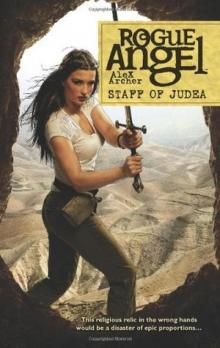 Staff of Judea
Staff of Judea Rogue Angel 55: Beneath Still Waters
Rogue Angel 55: Beneath Still Waters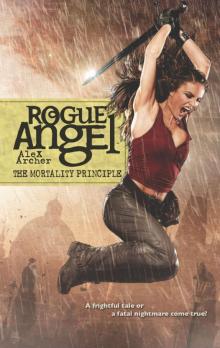 The Mortality Principle
The Mortality Principle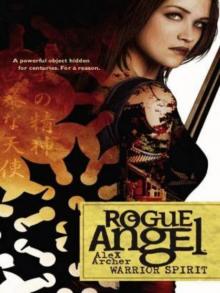 Warrior Spirit
Warrior Spirit Paradox
Paradox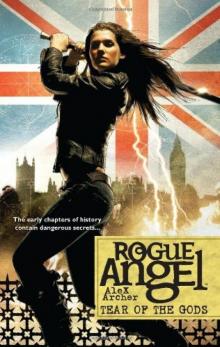 Tear of the Gods
Tear of the Gods Forbidden City
Forbidden City River of Nightmares (Rogue Angel)
River of Nightmares (Rogue Angel) Rogue Angel: The Secret of the Slaves
Rogue Angel: The Secret of the Slaves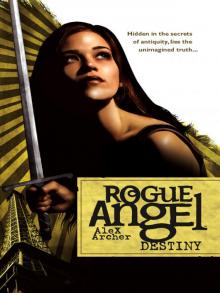 Destiny
Destiny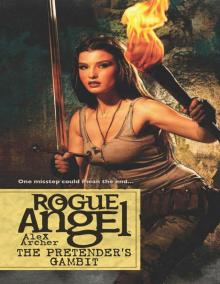 Rogue Angel 51: The Pretender's Gambit
Rogue Angel 51: The Pretender's Gambit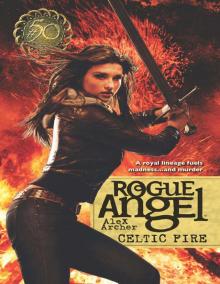 Celtic Fire
Celtic Fire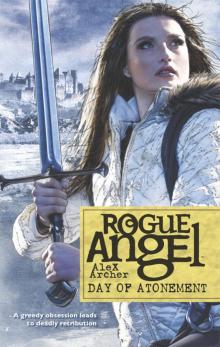 Rogue Angel 54: Day of Atonement
Rogue Angel 54: Day of Atonement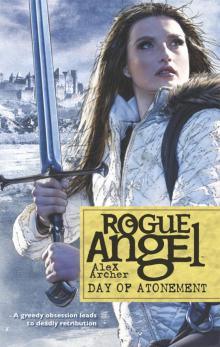 Day of Atonement
Day of Atonement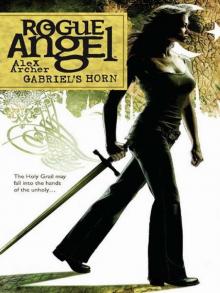 Rogue Angel: Gabriel's Horn
Rogue Angel: Gabriel's Horn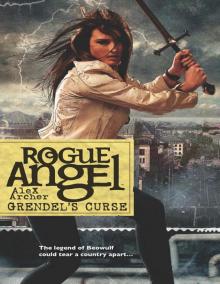 Grendel's Curse
Grendel's Curse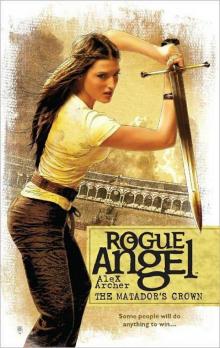 The Matador's Crown
The Matador's Crown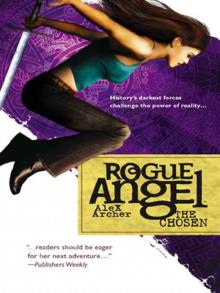 Rogue Angel: The Chosen
Rogue Angel: The Chosen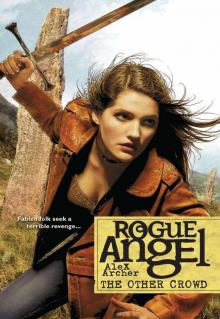 The Other Crowd
The Other Crowd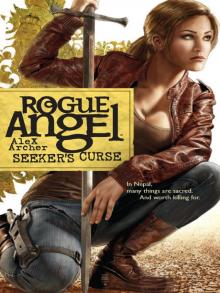 Seeker’s Curse
Seeker’s Curse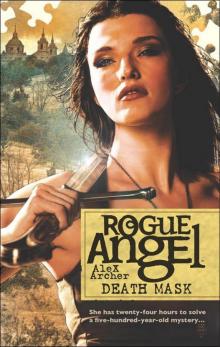 Rogue Angel 52: Death Mask
Rogue Angel 52: Death Mask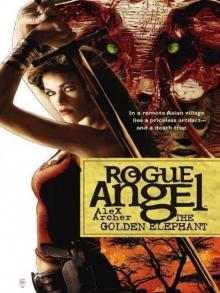 The Golden Elephant
The Golden Elephant Blood Cursed (Rogue Angel)
Blood Cursed (Rogue Angel)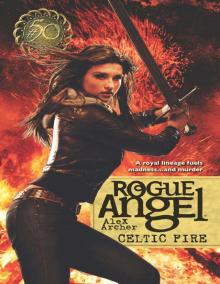 Celtic Fire (Rogue Angel)
Celtic Fire (Rogue Angel)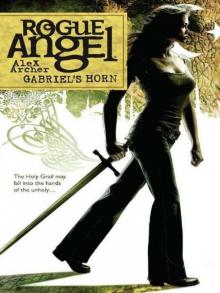 Gabriel's Horn
Gabriel's Horn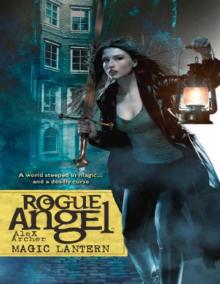 Magic Lantern (Rogue Angel)
Magic Lantern (Rogue Angel)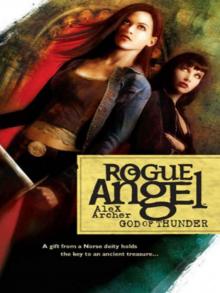 God of Thunder
God of Thunder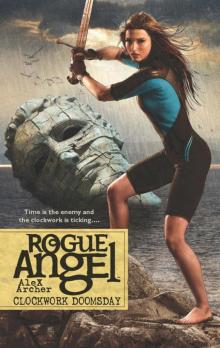 Clockwork Doomsday
Clockwork Doomsday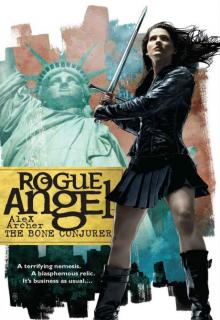 The Bone Conjurer
The Bone Conjurer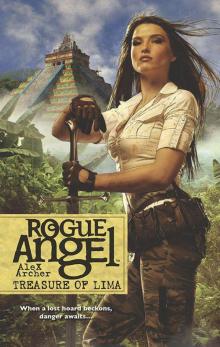 Treasure of Lima
Treasure of Lima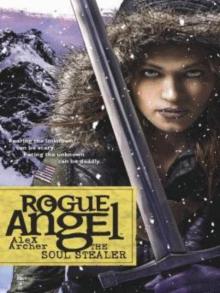 The Soul Stealer
The Soul Stealer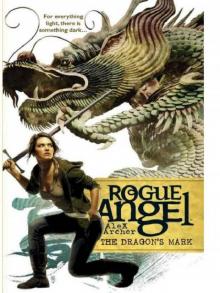 The Dragon’s Mark
The Dragon’s Mark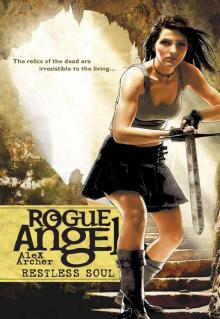 Restless Soul
Restless Soul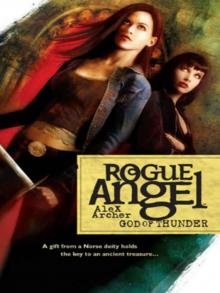 Rogue Angel: God Of Thunder
Rogue Angel: God Of Thunder Rogue Angel 49: The Devil's Chord
Rogue Angel 49: The Devil's Chord Death Mask
Death Mask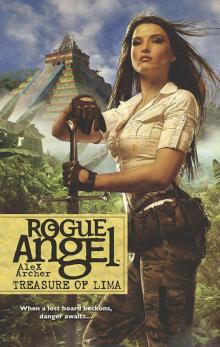 Rogue Angel 46: Treasure of Lima
Rogue Angel 46: Treasure of Lima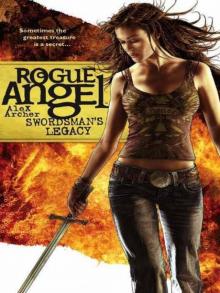 Swordsman's Legacy
Swordsman's Legacy The Oracle's Message
The Oracle's Message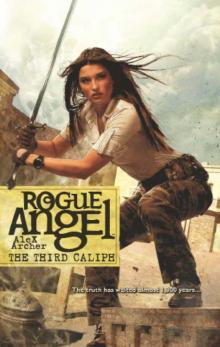 The Third Caliph
The Third Caliph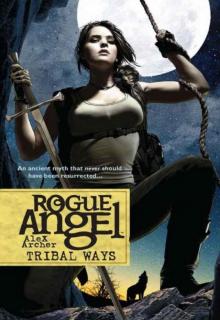 Tribal Ways
Tribal Ways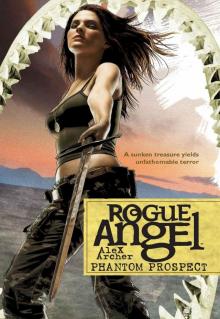 Phantom Prospect
Phantom Prospect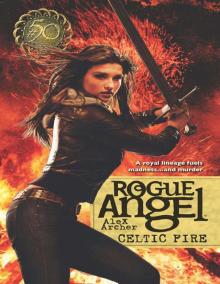 Rogue Angel 50: Celtic Fire
Rogue Angel 50: Celtic Fire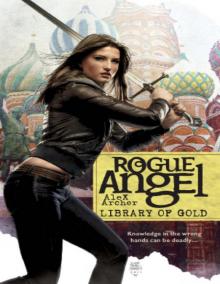 Library of Gold
Library of Gold Rogue Angel 53: Bathed in Blood
Rogue Angel 53: Bathed in Blood Sacred Ground
Sacred Ground The Devil's Chord
The Devil's Chord Serpent's Kiss
Serpent's Kiss The Vanishing Tribe
The Vanishing Tribe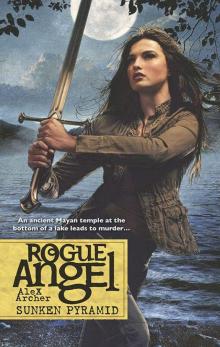 Sunken Pyramid
Sunken Pyramid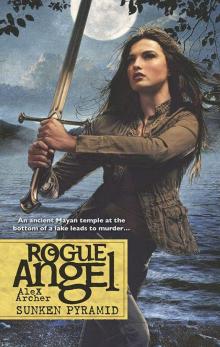 Sunken Pyramid (Rogue Angel)
Sunken Pyramid (Rogue Angel)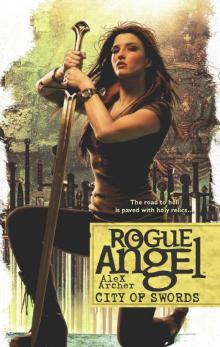 City of Swords
City of Swords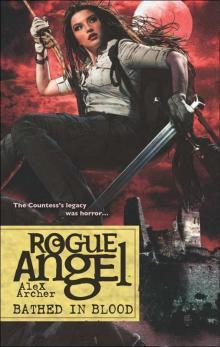 Bathed in Blood
Bathed in Blood The Lost Scrolls
The Lost Scrolls The Babel Codex
The Babel Codex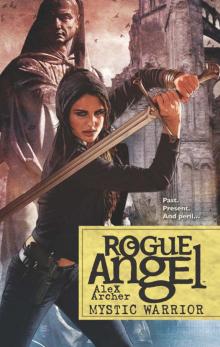 Mystic Warrior
Mystic Warrior Eternal Journey
Eternal Journey Beneath Still Waters
Beneath Still Waters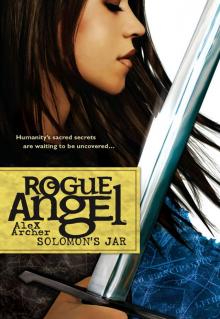 Solomon's Jar
Solomon's Jar Beneath Still Waters (Rogue Angel Book 55)
Beneath Still Waters (Rogue Angel Book 55) Cradle of Solitude
Cradle of Solitude Secret of the Slaves
Secret of the Slaves River of Nightmares
River of Nightmares Polar Quest
Polar Quest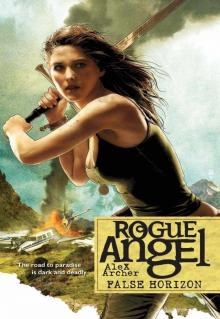 False Horizon
False Horizon